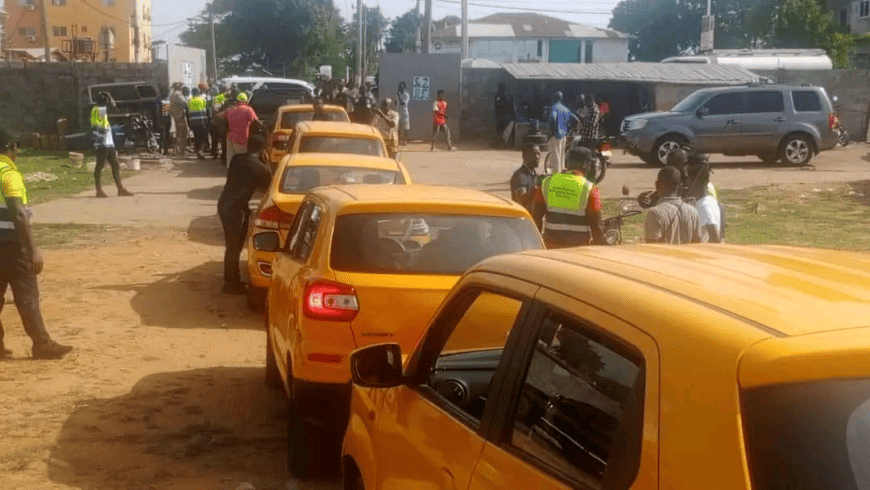Liberia: Gracious Ride Challenges Asset Recovery Task Force's Legality in Court

TEMPLE OF JUSTICE, Monrovia – Gracious Ride, represented by its legal counsel Cllr. Michael Wilkins Wright and Cllr. Abraham Zayzay, has taken legal action against the Asset Recovery and Property Retrieval Task Force, declaring it an illegal entity due to its lack of legislative authorization. The legal team argues that the task force operates without constitutional or legislative backing, rendering its actions unlawful.
The controversy also centers on Executive Order #126, issued by President Joseph Nyumah Boakai, which the petitioners claim enabled the task force to unlawfully seize Gracious Ride’s commercial vehicles in March 2024. According to Cllr. Wright, the task force obstructs the legally established Liberia Anti-Corruption Commission (LACC), which is the statutory body empowered to investigate and recover stolen state assets.
Supreme Court’s Involvement
The Supreme Court of Liberia first heard the case on July 4, 2024, and declared Executive Order #126 unconstitutional. However, the hearing was postponed due to a lack of quorum and rescheduled for January 14, 2025.
Gracious Ride contends that the task force unlawfully seized its vehicles on public streets, causing harm to its operations. The core issue in the case is whether President Boakai had the constitutional authority to create the Asset Recovery and Property Retrieval Task Force through an executive order, bypassing the legislative process.
Petitioner’s Arguments
Cllr. Wright argued that Executive Order #126 violates the separation of powers as outlined in Article 3 of the Liberian Constitution. He asserted that executive orders are only valid in cases of emergencies related to public health, national security, or other critical state concerns—conditions that were absent in this instance.
Key constitutional provisions cited by Cllr. Wright include:
- Article 89: Establishes autonomous public commissions like the LACC, mandating legislative oversight over their functions.
- Article 34: Grants the Legislature exclusive authority to create new agencies and pass laws.
- Article 3: Ensures the separation of powers among the executive, legislative, and judicial branches.
Wright argued that the task force duplicates the roles of existing institutions such as the LACC and the Financial Intelligence Unit (FIU), undermining their legal mandates. He also contended that the task force violated Gracious Ride’s rights by seizing its vehicles without proper legal justification or court orders.
Respondent’s Defense
The government’s legal representative, Cllr. Edwin Kla Martin, countered that Gracious Ride lacked standing to sue, referencing Chapter 11, Subsection 11(e) of the Civil Procedure Law of Liberia. He defended Executive Order #126 as being within the president’s authority under Article 50, which vests executive power in the president.
Cllr. Martin argued that the task force was necessary to investigate and recover assets believed to be stolen from the government. However, when questioned by Justice Yamie Gbeisay about the legality of vehicle seizures without documentation or notice, Martin admitted to procedural errors but maintained that the seizures were justified.
Judicial Concerns
During the hearing, Chief Justice Sie-A-Nyene G. Yuoh questioned the government’s failure to issue public notices or prior warnings before seizing vehicles. Cllr. Martin conceded these oversights but argued that the president’s executive authority justified the creation of the task force.
Martin urged the court to uphold the legality of Executive Order #126, emphasizing its importance in recovering stolen state assets.
Implications of the Case
The case raises critical questions about the limits of presidential authority, the separation of powers, and the legality of executive orders in Liberia. The Supreme Court’s ruling could have far-reaching implications for governance, institutional accountability, and the protection of private entities from government overreach.
The court has not yet issued its final ruling, but the hearing on January 14, 2025, marks a pivotal moment in the legal dispute. Both sides anticipate a landmark decision that could redefine the scope of executive authority in Liberia.
- Vibnix Blog
- Politics
- News
- Liberia News
- Entertainment
- Technology
- Educaţie
- Art
- Causes
- Crafts
- Dance
- Drinks
- Film
- Fitness
- Food
- Jocuri
- Gardening
- Health
- Home
- Literature
- Music
- Networking
- Alte
- Party
- Religion
- Shopping
- Sports
- Theater
- Wellness


